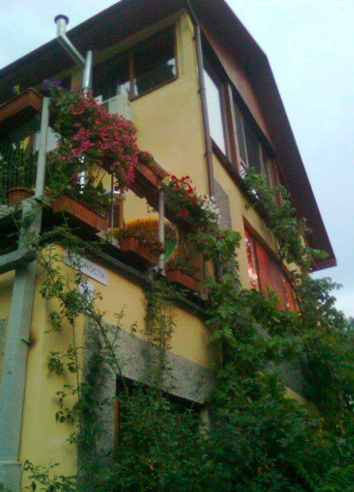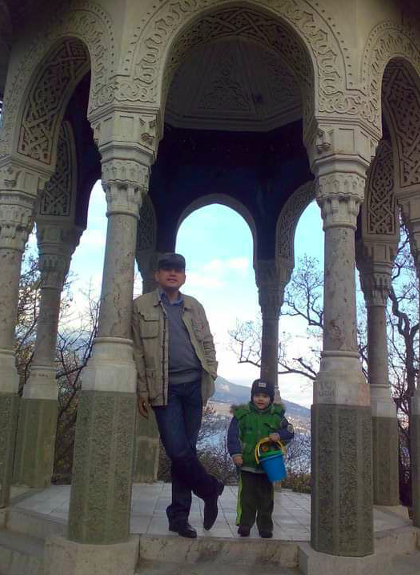The following testimony is one of several stories of forced migration gathered by Research Fellow Dr Diana Vonnak. Here Erfan, a lawyer and entrepreneur from Yalta in Crimea, discusses multiple forced displacements experienced by his family across different generations. He reflects on Russia’s annexation of Crimea and war of aggression against Ukraine against the backdrop of past Soviet deportations and oppression of Crimea’s minority Tatar population.
‘I am a Crimean Tatar, and a citizen of Ukraine. I was born in Uzbekistan in the Soviet Union in 1968 in a Crimean Tatar family. My father was born in Crimea in 1943, but, like my whole people, the family was deported by Stalin to Central Asia. So I was born in Al Malik.’
This is how Erfan starts to tell us about a life that took him back to his ancestral Crimea, only to be forced to move again in 2014, and yet again in 2022.
Erfan grew up in Soviet Uzbekistan, then moved to Russia, to Ivanov, to study law. This, as he describes, was a small miracle, since Crimean Tatars were collectively banned from studying law, journalism, political science, or any subject that might lead to political careers. He was accidentally recorded as a Russian Tatar and allowed to enter university. When he finished, the USSR collapsed, and for the first time in 45 years, Crimean Tatars were allowed to return. Erfan’s father decided to move immediately, and Erfan soon followed. He describes these early years as emotional. Flights from Tashkent to Sevastopol were filled with returnees.
‘It was only when I returned to Crimea that I understood what home means, what your native land means. Growing up in exile, as a child you don’t understand these things.’
As Erfan explains, the sense of euphoria faded quite quickly, when the returning exiles understood that everything they had previously owned had been taken and there would not be any policy to return property or land to its rightful owners. They ended up in a vicious circle: they could only get work if they were registered in Crimea, but they could only register with a valid job offer. These challenges, alongside hostilities between non-Tatar locals and the returnees, marred these initial years. Erfan found it difficult to find work in the public sector due to ethnic discrimination, so he moved into banking.

Unfortunately, Ukraine did not fully understand the nature of repression and mass deportation that Crimean Tatars experienced under Stalin and also later on in the USSR, says Erfan, even though the parallels with anti-Ukrainian measures were considerable. More recently, of course, this has changed; but now it is too late and Crimea is under Russian occupation.
Erfan’s wife, a Crimean Tatar, was born in Crimea in one of the few families that were spared from mass deportation. They lived without legal work and official papers for decades, keeping a low profile. A few hundred families like theirs remained in Crimea, some of mixed background, the majority semi-legally or illegally. When Erfan and his wife married, they built a house and had four children together.
In 2013, when then-president Viktor Yanukovych refused to sign Ukraine’s ascension agreement with the EU, and the Maidan Revolution started, Erfan was among the few from Crimea who joined immediately. He went to Kyiv with a Crimean Tatar flag and stood with the protesters, hoping to show Ukrainians that the Crimean Tatar community shares the goals of this protest. ‘I didn’t do anything violent, threw no Molotov cocktails, but once I helped building a barricade’. He talked to many people who had had little contact with Crimean Tatars before, explaining their struggle and the internal politics of the peninsula, where the Tatar minority’s positions often differed markedly from that of the local majority. On the day when the riot police clashed with the protesters, Erfan was abroad on a work trip, and when he returned on 21 February 2014 to Crimea, and saw anti-Maidan gatherings, meetings organised partly by non-locals: ‘I immediately understood that the Russians arrived.’
Not far from Erfan’s Yalta home was a sanatorium for Red Army veterans, where many Russian veterans would come for holidays and treatments. In those late February days he saw a column of military vehicles full of soldiers with rifles arrive at the sanatorium.
‘They talk about little green men [the covert Russian military men and others who organised the takeover of Crimea], but there was nothing green there, it was all open, Russian flags everywhere. Including on the local government buildings, even though that was illegal.’
From then on, everything sped up: local separatists, joined by militias, Russian soldiers without insignia and local politicians in favour of secession organised a referendum for mid-March without consultation with the Ukrainian Parliament. Although the international community did not recognise the referendum, and the majority of Crimean Tatars boycotted it, Crimea de facto joined the Russian Federation. The ca. 300 000 Crimean Tatars among the 1.9 million Crimean locals were a relatively small force in the peninsula, and Erfan felt bitter about the extent to which the local elites, including the police and municipal officials, allowed the annexation to happen, or even supported it.
Erfan was known locally in Yalta as a Maidan protestor and a pro-Ukrainian activist, so he knew he would likely be in trouble. With his wife and four children, he set out for Kyiv. His wife would go back time to time, covertly, to check on the house, but he himself never risked it. His sister with her family followed soon, and two years later Erfan’s mother also joined them in Kyiv.
They had nowhere to stay and he needed to find work fast. Although the family had savings and lived in relative financial stability in Crimea, building a new life from scratch was difficult. He opened a café in Kyiv and busied himself running it. His two youngest children were toddlers when they left Crimea; they barely remember it now.
Before the Maidan Revolution, Erfan felt rather disillusioned about Ukraine: he felt corruption was hopeless and relations between Crimean Tatars and Ukrainians were not amicable. He was considering emigration, especially in the years of Yanukovych’s reign, when he felt the country was taking a radically wrong turn. All this changed radically in those months, when he felt Ukrainians became much more appreciative of the Crimean Tatar struggle for political autonomy and self-determination. For the first time he felt that Crimean Tatar autonomy within a multicultural Ukraine could be a realistic possibility. By the end of Maidan, he decided not to leave Ukraine unless rockets hit his town – and even then only temporarily, for the sake of his family’s safety. ‘Then the rockets did indeed start falling!’ – he laughs.

In 2021, when the news about Russia’s military exercises dominated the news, he was worried about the future, but he did not expect a full-scale invasion. Family members in Sweden were pleading with Erfan to leave Ukraine and wait to see how things turned out from there. Erfan did not want to leave himself, but his wife and four children left on 14 February 2022, 10 days before the invasion. The children were reluctant, but their parents told them that, even if there was no escalation from Russia, the trip would be a great opportunity. The atmosphere in Kyiv was so tense; they felt relieved in the first days they were away.
Ten days later, when the invasion started, Erfan did not want to leave Ukraine, even though – with his disability – he would have been allowed to leave. ‘I wanted to fight anyway.’ Given his family history, especially their historic displacement from Crimea under Stalin, he was driven by a sense of justice and revenge. He joined the territorial defence forces, even though he has a prosthetic arm. He helped in patrolling activities as best as he could, but once the immediate danger in Kyiv was over, when the Russian army retreated in early April, he felt he could not contribute much. As soon as he could, he reopened his café, and his extended family works there now.
Erfan did not have an income during the first months of the war, when the Russian army was near Kyiv and cafés were all closed. Although he did manage to support his family to some extent, after four months in Sweden they felt they could not stay any longer, due to the cost of living and relatively low government support. The relatives they stayed with in Sweden lived in a remote location near a nature reserve, so daily transportation to school was difficult to arrange and expensive to maintain. Without language skills, and having to care for their children, Erfan’s wife felt that it would be very difficult to find work. They decided to go to Poland while they figured out where to seek temporary protection; and while there, they heard about the Scottish government program for Ukrainian refugees. They submitted their application, and after c. two months of waiting their request was approved. They were given accommodation on the Victoria liner, a cruise ship the City of Edinburgh repurposed to allow Ukrainian refugees to be housed there until a more permanent solution is found for them. They arrived in August 2022.
Erfan thinks a lot about identity and heritage. He grew up in a Russian-speaking environment in Uzbekistan, so even though his parents did speak Tatar, they did not pass this down to him. On the one hand, linguistic repression meant they were afraid of speaking it, and on the other had they worked shifts and did not spend much time at home. As a result of this, Erfan only speaks a few words. Among the Crimean Tatar community, hardly any people speak either of the two prominent Tatar languages fluently; centuries of marginalisation, the lack of statehood and minority language protection policies mean that literary Tatar has become near-extinct. It would require immense work to restore the language, and without meaningful political autonomy this would be impossible to realise. When Erfan thinks about Crimea’s future, he wants to see a region that is both Ukrainian and Tatar-speaking, and where English is taught at a high level. He does not support retaining Russian as a regional language officially.